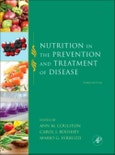Nutrition in the Prevention and Treatment of Disease, Third Edition is a comprehensive clinical nutrition textbook that integrates food issues with nutrition to provide a unique perspective to disease prevention/control. A proven classroom resource for understanding how nutrition can be used to improve health status, this book focuses on the clinical applications and disease prevention of nutrition, clearly linking the contributions of basic science to applied nutrition research and, in turn, to research-based patient care guidelines. The diversity of material makes this text useful for nutritional scientists and also for upper division nutrition course work.
This new edition contains chapters that have been completed updated and features 26 new authors or co-authors. Topics include: Surgery for Severe Obesity; Snacking and Energy Balance in Humans; Phytochemicals in the Prevention and Treatment of Obesity and Its Related Cancers; Bioavailability and Metabolism of Bioactive Compounds from Foods; and Dietary Bioactive Compounds for Health. There are also discussions on bioactive components present in edible plants of particular interest for the prevention of disease; management of patients who have undergone surgical treatment for obesity; and greatly expanded coverage of biomarkers used to monitor nutrition interventions. Updated appendices include the latest dietary reference intakes.
This book is aimed at upper division undergraduates and graduate students in nutrition and dietetics; professional nutritionists; dieticians; epidemiologists; general practitioners; nurse practitioners; and family medicine physicians.
Table of Contents
Section 1: Research Methodology A. Assessment Methods for Research and Practice 1. Dietary Assessment Methodology 2. Assessment of Dietary Supplement Use 3. Physical Assessment of Nutritional Status 4. Energy Requirement Methodology B. Research and Applied Methods for Observational and Intervention Studies 5. Application of Research Paradigms to Nutrition Practice 6. Overview of Nutritional Epidemiology 7. Analysis, Presentation, and Interpretation of Dietary Data 8. Current Theoretical Bases for Nutrition Intervention and Their Uses 9. Nutrition Intervention: Lessons from Clinical Trials 10. Tools and Techniques to Facilitate Nutrition Intervention 11. Evaluation of Nutrition Interventions 12. Biomarkers and Their Use in Nutrition Intervention
Section 2: Nutrition for Health Maintenance, Prevention, and Disease-Specific Treatment A. Food and Nutrient Intake for Health 13. Nutrition Guidelines to Maintain Health 14. Nutrition, Health Policy, and the Problem of Proof 15. Choline and Neural Development 16. Nutrition Requirements for Athletes 17. Nutrition for Children with Special Health Care Needs B. Dietary Bioactive Compounds for Health 18. Antioxidants in Health and Disease 19. Diet and Supplements in the Prevention and Treatment of Eye Diseases 20. Nutrients and Food Constituents in Cognitive Decline and Neurodegenerative Disease 21. Phytochemicals in prevention and treatment of Obesity and Related Disorder 22. Bioavailability and metabolism of bioactive compounds from foods C. Overweight and Obesity 23. Genetics of Human Obesity 24. Obesity: Overview of Treatments and Interventions 25. Surgical intervetion for obesity 26. Behavioral Risk Factors for Overweight and Obesity: Diet and Physical Activity 27. Dietary Approaches to Exploit Energy Balance Utilities for Body Weight Control D. Cardiovascular Disease 28. Genetic Influences on Blood Lipids and Cardiovascular Disease Risk 29. The Role of Diet in the Prevention and Treatment of Cardiovascular Disease 30. Nutrition, Lifestyle, and Hypertension E. Diabetes Mellitus 31. Obesity and the Risk for Diabetes 32. The Role of Diet in the Prevention and Treatment of Diabetes 33. Nutrition Management for Gestational Diabetes F. Cancer 34. Interaction of Nutrition and Genes in Carcinogenesis 35. Nutrition and Cancers of the Breast, Endometrium, and Ovary 36. Nutrition and Prostate Cancer 37. Nutrition and Colon Cancer G. Gastrointestinal Health and Disease 38. Intestinal Microflora and Diet in Health 39. Nutrition in Inflammatory Bowel Disease and Short Bowel Syndrome 40. Nutrient Considerations in Lactose Intolerance 41: Nutritional Considerations in the Management of Celiac Disease 42. Nutrition and Cystic Fibrosis H. Bone Health and Disease 43. Current Understanding of Vitamin D Metabolism, Nutritional Status, and Role in Disease Prevention 44. Osteoporosis: The Early Years 45. Osteoporosis in Adults








